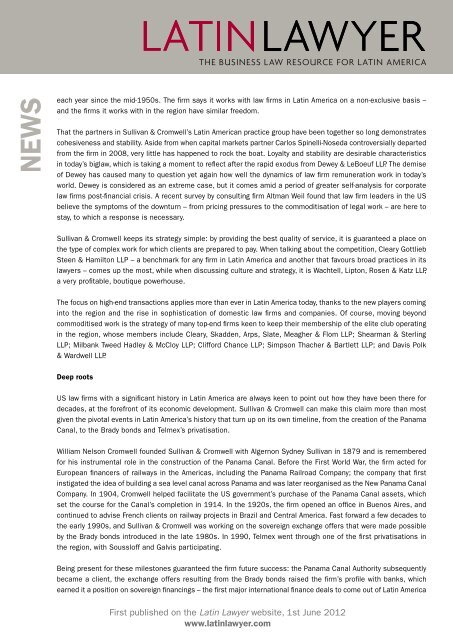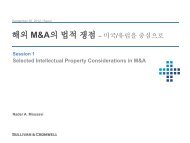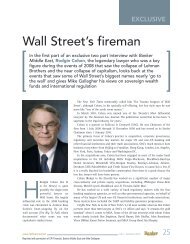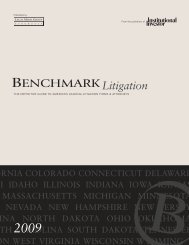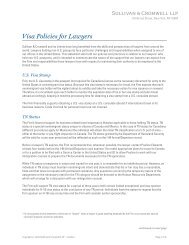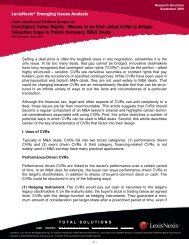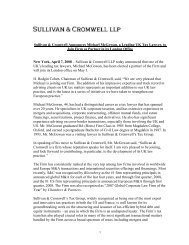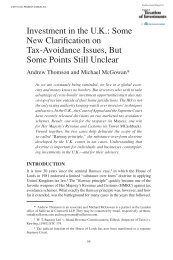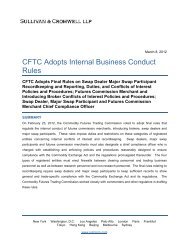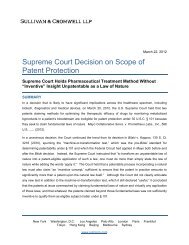THE GENERALISTS - Sullivan & Cromwell
THE GENERALISTS - Sullivan & Cromwell
THE GENERALISTS - Sullivan & Cromwell
Create successful ePaper yourself
Turn your PDF publications into a flip-book with our unique Google optimized e-Paper software.
news<br />
each year since the mid-1950s. The firm says it works with law firms in Latin America on a non-exclusive basis –<br />
and the firms it works with in the region have similar freedom.<br />
That the partners in <strong>Sullivan</strong> & <strong>Cromwell</strong>’s Latin American practice group have been together so long demonstrates<br />
cohesiveness and stability. Aside from when capital markets partner Carlos Spinelli-Noseda controversially departed<br />
from the firm in 2008, very little has happened to rock the boat. Loyalty and stability are desirable characteristics<br />
in today’s biglaw, which is taking a moment to reflect after the rapid exodus from Dewey & LeBoeuf LLP. The demise<br />
of Dewey has caused many to question yet again how well the dynamics of law firm remuneration work in today’s<br />
world. Dewey is considered as an extreme case, but it comes amid a period of greater self-analysis for corporate<br />
law firms post-financial crisis. A recent survey by consulting firm Altman Weil found that law firm leaders in the US<br />
believe the symptoms of the downturn – from pricing pressures to the commoditisation of legal work – are here to<br />
stay, to which a response is necessary.<br />
<strong>Sullivan</strong> & <strong>Cromwell</strong> keeps its strategy simple: by providing the best quality of service, it is guaranteed a place on<br />
the type of complex work for which clients are prepared to pay. When talking about the competition, Cleary Gottlieb<br />
Steen & Hamilton LLP – a benchmark for any firm in Latin America and another that favours broad practices in its<br />
lawyers – comes up the most, while when discussing culture and strategy, it is Wachtell, Lipton, Rosen & Katz LLP,<br />
a very profitable, boutique powerhouse.<br />
The focus on high-end transactions applies more than ever in Latin America today, thanks to the new players coming<br />
into the region and the rise in sophistication of domestic law firms and companies. Of course, moving beyond<br />
commoditised work is the strategy of many top-end firms keen to keep their membership of the elite club operating<br />
in the region, whose members include Cleary, Skadden, Arps, Slate, Meagher & Flom LLP; Shearman & Sterling<br />
LLP; Milbank Tweed Hadley & McCloy LLP; Clifford Chance LLP; Simpson Thacher & Bartlett LLP; and Davis Polk<br />
& Wardwell LLP.<br />
Deep roots<br />
US law firms with a significant history in Latin America are always keen to point out how they have been there for<br />
decades, at the forefront of its economic development. <strong>Sullivan</strong> & <strong>Cromwell</strong> can make this claim more than most<br />
given the pivotal events in Latin America’s history that turn up on its own timeline, from the creation of the Panama<br />
Canal, to the Brady bonds and Telmex’s privatisation.<br />
William Nelson <strong>Cromwell</strong> founded <strong>Sullivan</strong> & <strong>Cromwell</strong> with Algernon Sydney <strong>Sullivan</strong> in 1879 and is remembered<br />
for his instrumental role in the construction of the Panama Canal. Before the First World War, the firm acted for<br />
European financers of railways in the Americas, including the Panama Railroad Company; the company that first<br />
instigated the idea of building a sea level canal across Panama and was later reorganised as the New Panama Canal<br />
Company. In 1904, <strong>Cromwell</strong> helped facilitate the US government’s purchase of the Panama Canal assets, which<br />
set the course for the Canal’s completion in 1914. In the 1920s, the firm opened an office in Buenos Aires, and<br />
continued to advise French clients on railway projects in Brazil and Central America. Fast forward a few decades to<br />
the early 1990s, and <strong>Sullivan</strong> & <strong>Cromwell</strong> was working on the sovereign exchange offers that were made possible<br />
by the Brady bonds introduced in the late 1980s. In 1990, Telmex went through one of the first privatisations in<br />
the region, with Soussloff and Galvis participating.<br />
Being present for these milestones guaranteed the firm future success: the Panama Canal Authority subsequently<br />
became a client, the exchange offers resulting from the Brady bonds raised the firm’s profile with banks, which<br />
earned it a position on sovereign financings – the first major international finance deals to come out of Latin America<br />
First published on the Latin Lawyer website, 1st June 2012<br />
www.latinlawyer.com


